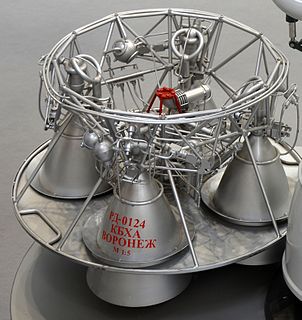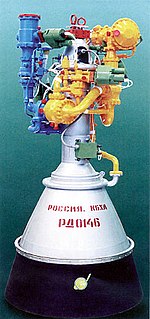The RD-8 is a Soviet / Ukrainian liquid propellant rocket engine burning LOX and RG-1 in an oxidizer rich staged combustion cycle. It has a four combustion chambers that provide thrust vector control by gimbaling each of the nozzles in a single axis ±33°. It was designed in Dnipropetrovsk by the Yuzhnoye Design Bureau as the vernier thruster of the Zenit second stage. As such, it has always been paired with the RD-120 engine for main propulsion.
RD-0410 was a Soviet nuclear thermal rocket engine developed by the Chemical Automatics Design Bureau in Voronezh from 1965 through the 1980s using liquid hydrogen propellant. The engine was ground-tested at the Semipalatinsk Test Site, and its use was incorporated in the Kurchatov Mars 1994 crewed mission proposal.

The RD-0124 is a rocket engine burning liquid oxygen and kerosene in a staged combustion cycle. RD-0124 engines are used on the Soyuz-2.1b and Soyuz-2-1v. A slight variation of the engine, the RD-0124A, is used on the Angara rocket family URM-2 upper stage. RD-0124 is developed by Chemical Automatics Design Bureau in Voronezh.

The RD-0146 is a liquid-fuel cryogenic rocket engine developed by KBKhA Kosberg in Voronezh, Russia.
The RD-120 is a liquid upper stage rocket engine burning RG-1 and LOX in an oxidizer rich staged combustion cycle with an O/F ratio of 2.6. It is used in the second stage of the Zenit family of launch vehicles. It has a single, fixed combustion chamber and thus on the Zenit it is paired with the RD-8 vernier engine. The engine has been developed from 1976 to 1985 by NPO Energomash with V.P. Radovsky leading the development. It is manufactured by, among others, Yuzhmash in Ukraine.

The RD-0110 is a rocket engine burning liquid oxygen and kerosene in a gas generator combustion cycle. It has four fixed nozzles and the output of the gas generator is directed to four secondary vernier nozzles to supply vector control of the stage. It has an extensive flight history with its initial versions having flown more than 57 years ago.
The RD-0214 (GRAU Index: 8D811) is a rocket vernier engine burning N2O4 and UDMH in a gas generator cycle. It has four nozzles that can each gimbal 45 in plane to provide TVC to the RD-0212 propulsion module of Proton third stage. It is a revised version of the RD-0207.

The RD-0210 (GRAU Index: 8D411K) is also known as the RD-465. It and its twin, the RD-0211, are rocket engines burning N2O4 and UDMH in an oxidizer rich staged combustion cycle. They have single nozzle, possess TVC and are the latest evolution in the RD-0203/4 lineage. They are the engines used on the Proton second stage. The RD-0213 is a fixed nozzle variation that is used on the RD-0212 module of the Proton third stage.
The RD-0216 and RD-0217 are liquid rocket engines, burning N2O4 and UDMH in the oxidizer rich staged combustion cycle. The only difference between the RD-0216 and the RD-0217 is that the latter has not a heat exchanger to heat the pressuring gasses for the tanks. Three RD-0216 and one RD-0217 were used on the first stage of the UR-100 ICBM. The engines were manufactured until 1974 and stayed in operational use until 1991. More than 1100 engines were produced.
The RD-0233 (GRAU Index 15D95) and RD-0234 (GRAU Index 15D96) are liquid rocket engines, burning N2O4 and UDMH in the oxidizer rich staged combustion cycle. The only difference between the RD-0233 and the RD-0234 is that the latter has a heat exchanger to heat the pressuring gasses for the tanks. Three RD-0233 and one RD-0234 are used on the first stage of the UR-100UTTKh ICBM. While the engine is out of production, the ICBM as well as Rokot and Strela remain operational as of 2015.
The RD-0236 (GRAU Index 15D114) is a liquid rocket vernier engine, burning N2O4 and UDMH in the gas generator cycle. It is used along the RD-0235 main engine on the UTTKh second stage, which was featured in the UR-100N ICBM as well as the Strela and Rokot launch vehicles derived from it. Its function is to supply thrust vector control by gimbaling each of its four nozzles in a plane. While the engine is out of production, the ICBM as well as Strela remain operational as of 2015. The Rokot launch vehicle conducted its final launch before retirement in December 2019.
The RD-0237 (GRAU Index 15D114) is a pressure-fed liquid rocket vernier engine, burning N2O4 and UDMH. It is used on the UR-100UTTKh MIRV vehicle to supply thrust vector control by gimbaling of its nozzle. While the engine is out of production, the ICBM and Strela remain operational as of 2015.
The RD-263 (GRAU Index 15D117) is a liquid rocket engine, burning N2O4 and UDMH in the oxidizer rich staged combustion cycle. Four RD-263 engines form a propulsion module RD-264 (GRAU Index 15D119). For the R-36M KB Yuzhnoye only ordered the first stage propulsion to Energomash, instead of both stages, arguing that they were overworked with the RD-270 development. By April 1970 Yuzhnoye was getting the engine documentation. By the end of 1972 Energomash started to test fire the engines in its own test stand. And by September 1973 the engine was certified for flight. While the engine is out of production, the ICBM as well as the Dnepr remain operational as of 2015.

The A.M. Isayev Chemical Engineering Design Bureau, also known as KB KhimMash or just KBKhM, is a Russian rocket engine design and manufacturing company. It is located in the city of Korolyov. It started as the OKB-2 division of the NII-88 research institute, where A.Isaev directed the development of liquid rocket engines for ballistic missile submarines.

The RD-250 (GRAU Index 8D518) is the base version of a dual-nozzle family of liquid rocket engines, burning N2O4 and UDMH in the oxidizer rich staged combustion cycle. The RD-250 was developed by OKB-456 for Yangel's PA Yuzhmash ICBM, the R-36 (8K67). Its variations were also used on the Tsyklon-2 and Tsyklon-3 launch vehicles. It was supposed to be used on the Tsyklon-4, but since the cancellation of the project it should be considered as out of production.
The RD-861 is a Soviet liquid propellant rocket engine burning UDMH and nitrogen tetroxide in a gas generator combustion cycle. It has a main combustion chamber, with four vernier nozzles fed by the gas generator output. It can be reignited a single time.
The RD-855 (GRAU Index 8D68M), also known as the RD-68M, is a four-nozzle liquid-fuel rocket vernier engine, burning N2O4 and UDMH in a gas generator cycle. It was used on the R-36, Tsyklon-2 and Tsyklon-3 first stage as thrust vector control by gimbaling of its nozzle. The engine is distributed through a cylindrical structure that is integrated around the main engine RD-251 module. The structure includes aerodynamic protection for the nozzles and small retro engines to assure the separation of the first stage. The engine was ignited two second before the RD-251 main engine.
The RD-856 (GRAU Index 8D69M), also known as the RD-69M, is a four-nozzle liquid-fuel rocket vernier engine, burning N2O4 and UDMH in a gas generator cycle. It was used on the R-36, Tsyklon-2 and Tsyklon-3 second stage as thrust vector control by gimbaling of its nozzle. The engine is distributed through a cylindrical structure that is integrated around the main engine RD-252 module. The structure includes aerodynamic protection for the nozzles. The engine was started by a pyrotechnic ignitor.
The RD-864 is a Soviet liquid propellant rocket engine burning UDMH and nitrogen tetroxide in a gas generator combustion cycle. It has a four combustion chambers that provide thrust vector control by gimbaling each nozzle in a single axis ±55°. It is used on the third stage of the R-36M UTTKh and Dnepr. For the R-36M2, an improved version, the RD-869 was developed.
The RD-801 is a Ukrainian liquid propellant rocket engine burning LOX and Kerosene (RG-1) in a staged combustion cycle. It has a single combustion chamber that provides thrust vector control by gimbaling of the nozzle in two axis by +/- 6°. It is being designed in Ukraine by Yuzhnoye Design Bureau for the prospective first stage propulsion of the Mayak rocket family.






